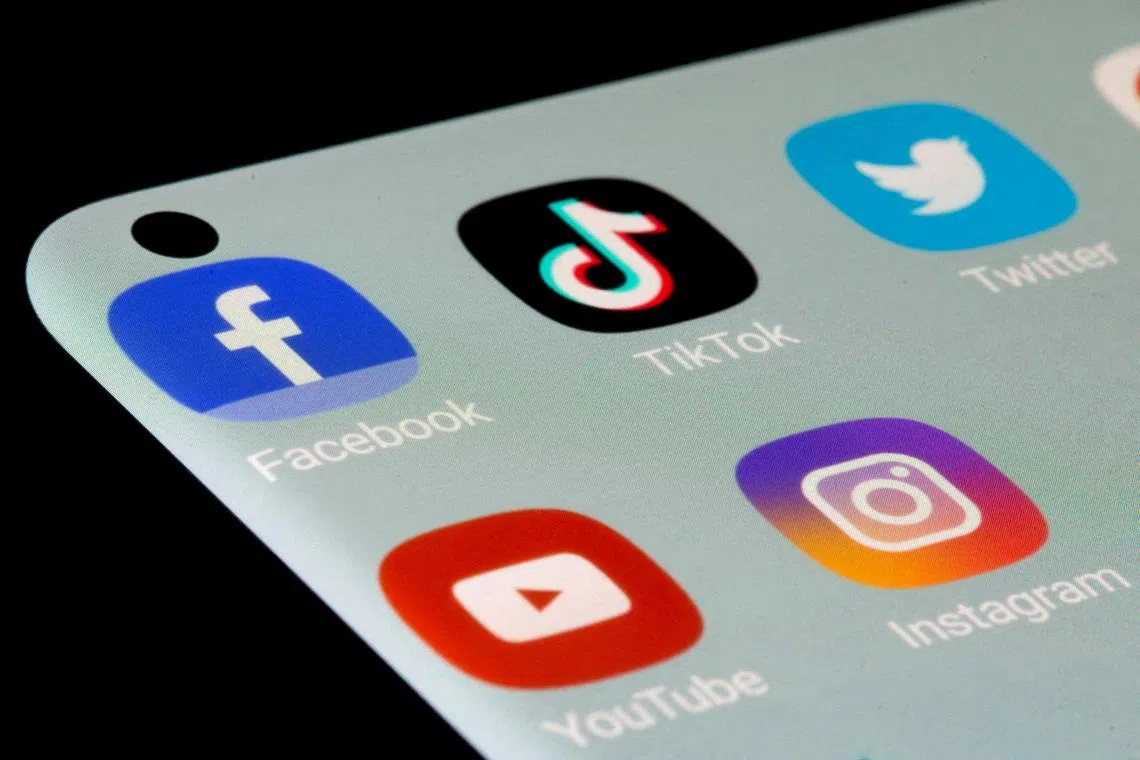Malaysia yet to license most social media platforms as new rules to curb online harm kick in
Sign up now: Get insights on the biggest stories in Malaysia

Checks by ST in Malaysia found there is, as yet, no interruption to any social media or messaging services that fall under the new licensing regime.
PHOTO: REUTERS
KUALA LUMPUR – Just two of at least eight main social media and messaging platforms have obtained licences under Malaysia’s controversial new regulatory framework, which is aimed at curbing harmful content and kicked in on Jan 1.
And they do not include the biggest tech giants like Meta and Google, whose online tools are among the most widely used in the country.
Strict new rules under the new licensing regime
The Malaysian Communications and Multimedia Commission (MCMC) said the two that received Applications Service Provider Class licences are Chinese tech firms ByteDance, which runs short-video platform TikTok, and Tencent, owner of messaging application WeChat.
It added that Meta, whose platforms include social media-sharing apps like Facebook, Instagram and messaging service WhatsApp, has “initiated the process of obtaining their licences to operate its platforms in the country”.
Although the internet regulator added in its Jan 1 press statement that instant messaging operator Telegram “is in the final stages of the licensing process”, it did not say whether a formal application had been made before the Dec 31 deadline lapsed.
The MCMC said Google and micro-posting service X had failed to submit applications. The regulator is now “actively reviewing the validity” of X’s claims that its Malaysian user base was below the licensing threshold of eight million accounts.
As for Google, “there were issues raised on the video-sharing features of YouTube and its classification under the licensing framework”, according to the MCMC statement.
But the commission insisted that having deliberated on the issues raised, it will ensure YouTube and all relevant platform providers meeting the licensing criteria are bound by their duties and responsibilities to adhere to the licensing framework, which is now in force.
A government official told ST that Google had argued during discussions with the government that YouTube was neither a social media nor messaging platform, and thus is not bound by the new regulations.
The new developments come after the MCMC said on Dec 26 that only Tencent and Telegram had begun the licensing process and warned that “failure to (submit licensing applications) may result in regulatory actions to be initiated, which all parties are keen to avoid”.
The regulator did not mention in its Jan 1 press statement whether any action would be taken against the firms that failed to apply for licences, nor did it respond to queries sent by ST on the matter.
Checks by ST in Malaysia found there is, as yet, no interruption to any social media or messaging services that fall under the licensing regime.
The authorities say the new rules are aimed at tackling the growth of scams, online gambling, bullying and sexual crimes, especially involving minors.
An initial draft of a code of conduct that licensees must abide by also prescribes pre-emptive action to be taken against accounts deemed likely to post offending material.
The new provisions have sparked concerns of overreach
This comes after sustained criticism of Prime Minister Anwar Ibrahim’s government’s alleged clampdown on free speech, given the surge in takedown requests
However, sources privy to the discussions between the social media operators and the government told ST that negotiations have been ongoing to relax some of the restrictions.
Key issues include the liability of jail time of up to 10 years, the requirement to register a local entity instead of a foreign company, and contributions of 6 per cent of Malaysian revenue to the Universal Service Provision Fund, aimed at narrowing the nation’s digital divide.
However, not having a local representative office would raise questions over criminal liability for offshore entities.
Said one government official: “Telecommunications providers have been the main contributors to the fund to ensure internet infrastructure is built even in rural areas.
“Getting social media (platforms) to contribute seems strange, given that the likes of data centres and cloud computing firms are not being asked to do the same.”
Shannon Teoh is The Straits Times’ bureau chief for Malaysia, where he has reported on various beats since 1998.



